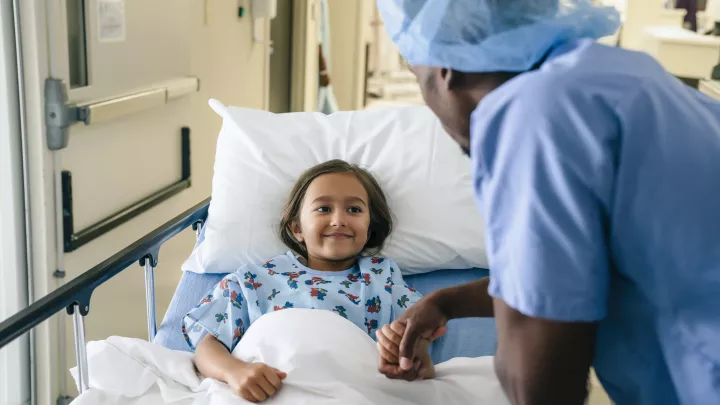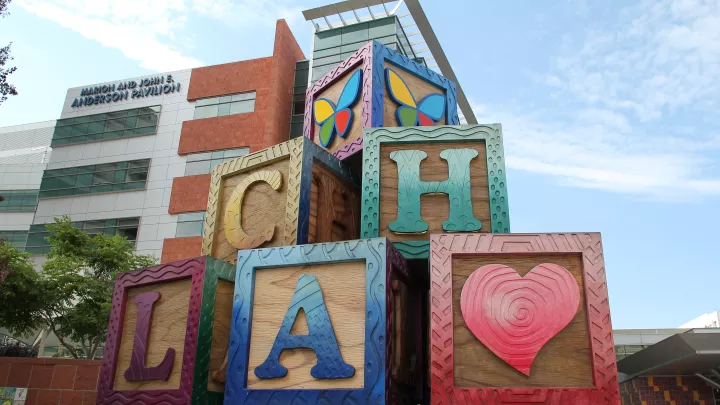Pancreas Program
The Pancreas Program at Children’s Hospital Los Angeles provides an organized, coordinated and efficient means of diagnosing and treating children with pancreatic disorders.
Pancreatic disorders include a variety of conditions which affects the endocrine and digestive functions. The pancreas is a glandular organ in the digestive system and endocrine system. It produces important hormones and secretes digestive enzymes that assist digestion and absorption of nutrients in the small intestine.
Our team cares for the pancreatic disorders and conditions. We closely collaborate with the pain team and endocrinology team, providing opportunities for our specialists to the patients' progress and to look for ways to enhance their care. As patients near adulthood, our social workers help them make a smooth transition to an adult provider.
Commonly Treated Disorders
- Acute recurrent pancreatitis (ARP) and chronic pancreatitis (CP)
- Autoimmune pancreatitis
- Hereditary pancreatitis
- Congenital pancreatic abnormalities include:
- Annular pancreas
- Pancreas divisum
- Pancreatic cysts and pseudocysts
- Pancreatic tumors
- Pancreatic exocrine insufficiency
- Pancreatic trauma
- Treatment Options / Surgery
Common Diseases
Acute Pancreatitis in Children
What Is Acute Pancreatitis?
Acute pancreatitis is an inflammation of the pancreas that typically causes very sudden and very severe abdominal pain. Acute pancreatitis can have serious complications, so it is typically treated in the hospital. Most of the time, it recovers without any serious problems. But in more severe cases of pancreatitis, treating the complications may take up to several months.
Causes
Many cases of acute pancreatitis occur in children who have a separate illness. Some of these illnesses affect multiple organs. Other common causes of acute pancreatitis in children include infection, physical injury, certain medications, gallstones, or problems in the anatomy of the ducts (tubes) in the liver or pancreas. Bicycle handle-bar injuries or blunt trauma to the mid-upper abdomen can cause pancreatitis. Common medications that are associated with pancreatitis include anti-seizure medications, chemotherapy agents and certain antibiotics. In up to 35% of children with acute pancreatitis, a cause will not be identified.
Causes include:
- Systemic illnesses associated with pancreatitis.
- Gallstone and Bile duct obstruction disease
- Trauma—motor vehicle accidents or bike handlebar injuries
- Medications
- Pancreas structure
- Infections
- Genetic – genes mutation
- Metabolic disease
- Toxins
Signs and Symptoms
Acute pancreatitis symptoms are nonspecific and can easily be confused with signs of another disease. They also vary depending on your child’s age and developmental level; for instance, non-verbal infants may present with increased crying. However, not every patient with pancreatitis will have all of these symptoms.
Common symptoms include:
- Abdominal pain
- Irritability (infants)
- Nausea
- Vomiting
- Loss of appetite
- Back pain
- Fever
- Fast breathing
- Fast heart beat
Complications
Most cases resolve in 7–10 days without complications. 13%–20% of children have a prolonged course with complications. In children, mortality rate ranges from 2%–10%, typically associated with systemic illness.
- Acute fluid collection around pancreas
- Pseudocyst: fluid collection around pancreas >4 weeks with a thin surrounding wall
- Fat necrosis
- Infection of the fluid collection
- Multi organs illness
Diagnosis
There is no single test to diagnose pancreatitis. The diagnosis is clinical and depends on the presence of symptoms consistent with acute pancreatitis, abnormal blood tests, or radiographic images showing inflammation in the pancreas. A diagnosis of acute pancreatitis can be made if two or more of these criteria are fulfilled.
Amylase and lipase are the most commonly measured blood tests. Both are enzymes which are made by the pancreas to aid digestion of foods. When the pancreas is injured or inflamed, the blood levels of both amylase and lipase can rise above normal. Since other conditions can also raise these enzyme levels, they are not specific for pancreatitis. Thus, in the absence of concerning symptoms or radiologic signs of pancreatitis, an elevation in either the amylase or the lipase level does not necessarily lead to a diagnosis of pancreatitis.
Ultrasound and CT scans are the most common imaging modalities that can be used to look for pancreatic irritation. Importantly, the pancreas can sometimes appear normal on these scans during an episode of pancreatitis.
Treatment
The treatment of pancreatitis is supportive care. There is no single medication or treatment that will help the pancreas to recover. Patients who have abdominal pain can be treated with pain medications. Nausea and vomiting are treated with anti-nausea medications.
If a patient can’t tolerate eating by mouth because of pain, nausea, or vomiting, he or she will not be allowed to eat and will be hydrated with intravenous (IV) fluids.
Your child can start eating when he or she feels hungry and is ready to eat. Any number of initial diets may be offered, ranging from clear liquids to regular food. The choice depends on how ill your child is and the preference of the doctors caring for your child. Most children feel well enough to start eating within the first day or two after an episode of acute pancreatitis. Occasionally, their symptoms may be more severe or persist for a longer period of time. If this is the case, your child may be given nutrition through a feeding tube or an IV to prevent malnutrition and improve healing.
Chronic Pancreatitis in Children
What Is Chronic Pancreatitis?
Chronic Pancreatitis is a progressive inflammatory of the pancreas which causes permanent damage to the pancreas tissue and permanent loss of pancreatic function.
Causes
- Systemic illnesses associated with pancreatitis.
- Gallstone and Bile duct obstruction disease
- Trauma—motor vehicle accidents or bike handlebar injuries
- Medications
- Congenital structural abnormalities
- Genetic – genes mutation
- Metabolic disease
- Toxins
- Unknown reasons
Signs and Symptoms
Frequent or chronic abdominal pain is the most common symptom of pancreatitis. The pain can be constant or can come and go unpredictably.
- Repeated attacks of abdominal pain
- Irritability (infants)
- Nausea
- Vomiting
- diarrhea and oily bowel movements
- trouble digesting food
- weight loss or poor growth
- Diabetes generally takes many years to appear, but this, too, is highly variable; some patients with chronic pancreatitis will develop diabetes in adolescence.
Diagnosis
The diagnosis of chronic pancreatitis requires the demonstration of irreversible damage to the pancreas, loss of digestive function or present with diabetes. Currently, damage is assessed by radiographic studies such as CT or MRI scans of the pancreas, by special endoscopic procedures known as ERCP, or by endoscopic ultrasound.
Treatment
If there is an anatomic abnormality, then surgery, often performed through an endoscope, can be curative. Metabolic abnormalities such as high serum calcium or serum fat (triglycerides) can also be treated.
Currently, there are no effective medical treatments for patients with a genetic predisposition. Some patients are candidates for surgery. In this procedure, the surgeon removes the pancreas and the hormone-producing cells known as ‘islets’ are isolated and returned to the patient, usually by injecting them into the liver. This surgical procedure is called ‘pancreatectomy with islet cell autotransplant.’ Many physicians will prescribe pills containing pancreatic digestive enzymes to patients who experience chronic pain. Some patients may require pain team follow up to management chronic pain.
Clinical Trials and Research
INSPPIRE 2 study
Acute pancreatitis (AP) was once considered an uncommon disease of childhood. In recent years, the number of children with AP has increased to an annual incidence approaching that of adults. Despite modest incidence rates, ARP and CP are associated with significance disease burden. The risk factors that predispose children to recurrent attacks of AP, then progression from ARP to CP and finally to exocrine and endocrine pancreatic insufficiency are not known. The INSPPIRE Consortium was formed to systematically characterize ARP and CP in children and address the knowledge gap in pediatric pancreatitis. We plan to overcome these barriers using the collective expertise, data, and samples provided by all collaborating sites.
Biliary Dyskinesia
Biliary Dyskinesia is a motility disorder that affects the gallbladder and sphincter of Oddi. Patients with this condition present with biliary-type pain, and investigations show no evidence of gallstones in the gallbladder. Collaborating with surgical team, the purpose of this study is to describe the current population of pediatric patients undergoing cholecystectomy for biliary dyskinesia and help construct a predictive model.
FAQ
Does my child have to stay overnight in a hospital if he/she gets pancreatitis?
Not necessarily. Most cases resolve in 7–10 days without complications. If your child can tolerate eating enough food or drinking enough liquids to stay hydrated, and pain can be controlled with oral medications, he or she might not need to stay in a hospital for treatment.
How long will pancreatitis last?
On average, symptoms of pancreatitis will last about a week. This does not mean your child will be in the hospital for that whole time period, since symptoms do improve over time. A few patients have more severe disease and may end up staying in the hospital for a month or more.
If my child gets acute pancreatitis, are there any long-term complications?
The complications of acute pancreatitis depend on the severity of the pancreatic irritation. The most common complication is the collection of fluid around the pancreas. These collections can be small or large enough to cause abdominal distension. Generally, the fluid will go away with time. If the pockets of fluid cause symptoms, doctors may recommend draining the fluid. The symptoms of fluid collections include vomiting from blockage of the stomach or part of the small intestine and fever due to infection. Rarely, the fluid collections will cause bleeding into the abdomen or intestines.
Can my child die from acute pancreatitis?
Death from acute pancreatitis is quite rare in children–but it can happen. In children, mortality rate ranges from 2%–10. Most deaths associated with pancreatitis occur in children who have a significant illness that damages multiple organs.
Can pancreatitis recur?
Yes, it can. About 10% of children will experience another bout of acute pancreatitis. Even fewer will have multiple episodes. If your child has another episode, his or her doctor will do additional testing to search for known causes of recurrent acute pancreatitis.
How can I prevent pancreatitis?
There are some treatable causes of acute pancreatitis. These include gallstone disease, high blood calcium, high blood triglycerides, and abnormalities of the bile ducts that come from the liver, or the ducts within the pancreas. Treatment of these disorders can help prevent future episodes. Unfortunately, for most patients, there is no way to prevent pancreatitis.
Is there a specific diet my child should be following?
There is no clear evidence that a special diet is required for chronic pancreatitis. Still many physicians will prescribe a low-fat diet, and advise their patients to eat more frequent, smaller meals, typically with fewer than 10 grams of fat. About 20 potato chips contain 10 grams of fat, so it takes discipline to make sure to stay within this range. Patients who have lost the ability to digest food will be prescribed pills containing pancreatic enzymes to help with digestion. They may also be prescribed fat-soluble vitamins A, D, E, and K, since the difficulty absorbing fat also interferes with patients’ ability to absorb these vitamins, which are crucial for maintaining good health.
Can chronic pancreatitis give my child cancer?
If your child has chronic pancreatitis, he or she will be at an increased risk of developing pancreatic cancer compared to the general population. The degree of risk depends on the underlying cause of pancreatitis and should be discussed with your doctor.


